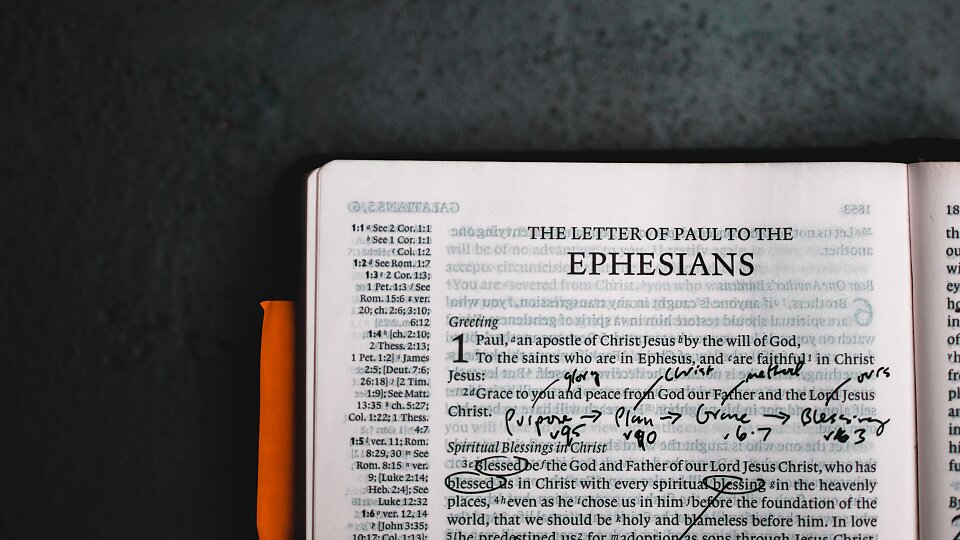The Pronouns Have It AGAIN
Last time, I shared some insights regarding the differences between ancient Greek speech making and modern American letter writing, and as an example took you through the first fourteen verses of Ephesians.
Once readers make the proper distinction between the “we” and the “you,” they are much more able to get to the heart of the entire book.
Which is . . . ?
Well, if you had asked me a few years ago for the central thrust of Ephesians, I would have taken you right to 2:8-9:
8 For it is by grace you have been saved, through faith—and this is not from yourselves, it is the gift of God— 9 not by works, so that no one can boast.
What a declaration! If it was good enough to inspire Martin Luther to start the Reformation, it’s good enough to serve as the main point of the book, right? Ephesians is a mini-manifesto about salvation by grace.
Well, Ephesians includes teaching about sola fide, but that’s not its heart.
Or another possible answer to the Ephesians question might have come from the glorious prayer in 3:14-21, a prayer that served no small role in my own call to ministry:
14 For this reason I kneel before the Father, 15 from whom every family[a] in heaven and on earth derives its name. 16 I pray that out of his glorious riches he may strengthen you with power through his Spirit in your inner being, 17 so that Christ may dwell in your hearts through faith. And I pray that you, being rooted and established in love, 18 may have power, together with all the Lord’s holy people, to grasp how wide and long and high and deep is the love of Christ, 19 and to know this love that surpasses knowledge—that you may be filled to the measure of all the fullness of God.
20 Now to him who is able to do immeasurably more than all we ask or imagine, according to his power that is at work within us, 21 to him be glory in the church and in Christ Jesus throughout all generations, for ever and ever! Amen.
Glory! Ephesians is about tapping into the incredible power that resides simultaneously at the center of the universe and in the middle of our hearts! If that doesn’t get your spiritual adrenaline flowing, nothing will.
Except. That’s part of Ephesians’ contribution, but it’s still not the primary purpose behind Paul’s letter to the burgeoning Christian community there.
To discover that, remember how the letter starts in 1:1-14: a divine fusion of “we” and “you,” a melding of Jew and Gentile, a creation of one new community out of what had been discord and division.
We see the culmination of that theme in 2:11-22:
11 Therefore, remember that formerly you who are Gentiles by birth and called “uncircumcised” by those who call themselves “the circumcision” (which is done in the body by human hands)— 12 remember that at that time you were separate from Christ, excluded from citizenship in Israel and foreigners to the covenants of the promise, without hope and without God in the world. 13 But now in Christ Jesus you who once were far away have been brought near by the blood of Christ.
14 For he himself is our peace, who has made the two groups one and has destroyed the barrier, the dividing wall of hostility, 15 by setting aside in his flesh the law with its commands and regulations. His purpose was to create in himself one new humanity out of the two, thus making peace, 16 and in one body to reconcile both of them to God through the cross, by which he put to death their hostility. 17 He came and preached peace to you who were far away and peace to those who were near. 18 For through him we both have access to the Father by one Spirit.
19 Consequently, you are no longer foreigners and strangers, but fellow citizens with God’s people and also members of his household, 20 built on the foundation of the apostles and prophets, with Christ Jesus himself as the chief cornerstone. 21 In him the whole building is joined together and rises to become a holy temple in the Lord. 22 And in him you too are being built together to become a dwelling in which God lives by his Spirit.
The entire section is brilliant, but it’s 2:15 that’s the nutshell: “to create in himself one new humanity out of the two.” Paul wrote Ephesians to let Jew and Gentile alike know that when they reside together in a country called Christ, God would create an entirely new race of people.
People no longer connected by blood. People bought by blood.
People no longer identified by race. People identified by resurrection.
People no longer separated by class. People united by cross.
And please note: such unity within diversity is not simply for its own sake. It doesn’t stem from a politically correct, can’t we all just get along? mindset.
This kind of diversity happens only as the gift of God and is lived out for the glory of God.
At Good Shepherd, we call it going full color. God’s idea, not ours. God’s doing, not ours.
It’s a movement that started in Ephesus . . . and Rome . . . and we’re just glad to be part of it.
Next time, we’ll check in on Ephesians 3, the culmination of Paul’s entire argument.

